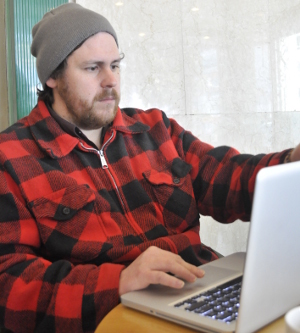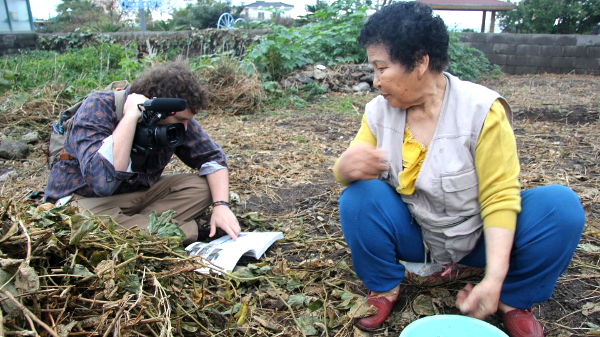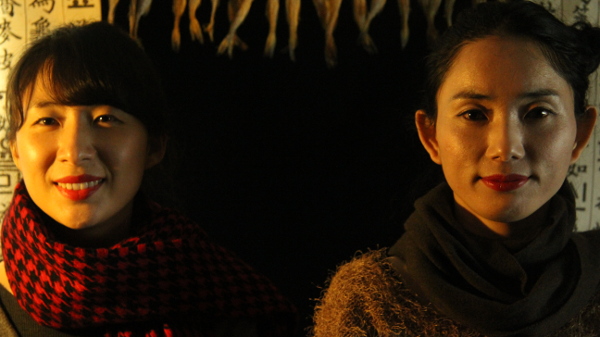|
You have probably seen Joey Rositano around town. A native of Nashville, Tennessee, Joey has been living on the island for the past six years and has become a well-known face in the foreign community here.
| |
 |
|
| ▲ Joey Rositano. Photo by The Jeju Weekly |
I first met Joey years ago at The Factory in Jeju City and we got to talking about how we both had lived in Spain. Little did I know then that we had more in common than simply our joy of siestas and Spanish. We share a common interest in the history and culture of Jeju, specifically musok, the island’s indigenous shaman religion.
Currently, Joey is in the final stages of shooting a documentary that has taken him all over the island investigating ghost stories, most of which specifically relate to musok. He has hundreds of hours of film and once finished, which will be in the next couple of months, he plans to hit film festivals throughout the world.
Why did you decide to come here?
I had a friend, he’s gone now, Isaac Bettis. He was a high school friend and he came here to study hapkido. I lived in Spain before, I taught in Spain. I had problems with my visa there and he sent me some pictures of him on a motorcycle riding around Jeju Island. I pretty much decided to come on impulse.
Why did you decide to make a documentary about Jeju ghost stories?
I decided to do this project because I wanted to get to know Jeju in a different way. As a teacher, we only kind of get one area. You could branch out if you want to, if you're adventurous and you want to explore different things. This was kind of a way to get me into the countryside and interacting with people in the countryside and just see Jeju in a more fuller kind of way. That was the impetus.
Could you please explain the project?
The project is primarily about the traditional religion, the shaman religion in Jeju. But it is not limited to that. It’s also about Jeju people and Koreans’ conception to religion and the soul and kind of mysticism and the nature of possession or ghosts. It’s not limited to musok. There is a lot of location ghost stories in Jeju that are in the documentary as well.
| |
 |
|
| ▲ During filming. Photo by Natasha Mistry |
| |
 |
|
| ▲ An image from Joey Rositano's as yet unnamed documentary. Photo by Natasha Mistry |
How did you become involved with this topic?
The original idea was grandmothers’ stories. I was just going to interview grandmothers on the island to tell about the old times. Then, I met a Korean friend and we were talking about it and we kind of came up with the idea together to limit it to ghost stories. So, first we were going to do the ghost stories like in the traditional Korean form, like the horror movies. As it evolved, I realised how important the musok belief was in old Jeju. So the topic kind of shifted to that. It wasn’t definite at first but that seemed like the topic with the most weight.
As a Westerner, what are some of the difficulties in making a film about something very Jeju specific?
Language is difficult, though I do most of my own interviews, I do speak Korean pretty well. If I interview an expert or something that needs very technical language I bring an interpreter along. The language, and definitely judging how openly I can ask certain questions is very hard. For example, a lot of old people have told me about the [Jeju April 3] massacre and I’ve been really uncomfortable about how much I can ask. I’ve been really surprised about how forthcoming they are. I couldn't believe it actually. They seem to voluntarily want to tell me about it. And sometimes it's off topic but I just kind of roll with it. That’s made quite an impression upon me. It has affected me a lot.
How so?
I guess, you hear about these things, but until you talk to someone who has lived through it you don’t really feel the reality of it. And I know people say that, but I never had that experience before so I guess I imagined that I could understand the reality of it without really interacting with somebody, from reading about it. But it’s not true. Once you meet somebody who’s been through something like that it makes a greater impact.
Any other difficulties?
There is some shame attached to musok. A lot of people want to write it up as a superstition. I don’t really get negative reactions but people who are catholic or non-believers sometimes, they ask me, “Why are you doing this? Why are you researching this it’s just a superstition.” They don't feel very positive about it.
What motivates you to see this project through?
I think every story is really a mystery. I was told that one ritual that I saw, they never had an outsider and they think that this might have been the first time in history that an outsider had seen it. There are a few straggling places where the traditions are really holding on. In one village I went to, there were only five people left making the offering whereas 50 years ago you’d have like 800 people there. The mystery of it has kind of driven me. What can I discover or what aspect of the culture is hiding under the next rock? That is what has driven me.
How did you pick your stories?
It’s been a bit better than random. Early on I met a woman who is kind of an expert in Jeju language, unofficially. She’s made a dictionary of Jeju language and does research. She’s just a geek. She’s into everything. She told me just a few key stories that would be excellent for film because they are bit more visual or dramatic. It’s really a film about stories. I chose four or five stories. There are hundreds and everytime I hear a new story i’m like “I should research that one” but I really can’t, I have to limit myself. It’s hard to choose.
Is there anything else you’d like to add about your experience making this documentary?
I’d like to say I’m grateful for all the help that I’ve gotten. I have two Korean narrators who have helped a lot, and other people in the community, too. People have been pretty open so that has been a significant thing. I didn’t really know what I was getting into when I started. I didn’t know if people would turn me away. It’s amazing, people like to talk. They do share their stories with me. Depending on their comfort level, I surprised a lot of grandmothers in fields and grandfathers, but usually they’re really brave people.
(This interview has been edited for length.)
|






















